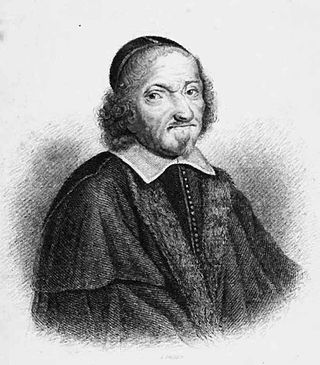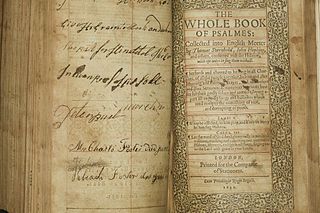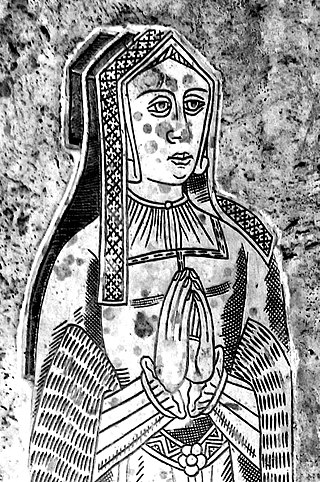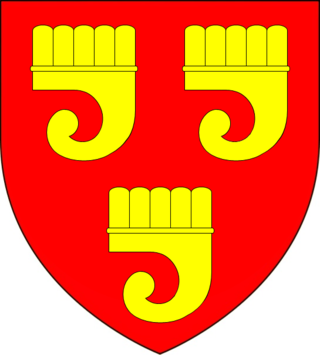Related Research Articles

Myles Coverdale, first name also spelt Miles, was an English ecclesiastical reformer chiefly known as a Bible translator, preacher and, briefly, Bishop of Exeter (1551–1553). In 1535, Coverdale produced the first complete printed translation of the Bible into English. His theological development is a paradigm of the progress of the English Reformation from 1530 to 1552. By the time of his death, he had transitioned into an early Puritan, affiliated to Calvin, yet still advocating the teachings of Augustine.

Edmund Bonner was Bishop of London from 1539 to 1549 and again from 1553 to 1559. Initially an instrumental figure in the schism of Henry VIII from Rome, he was antagonised by the Protestant reforms introduced by the Duke of Somerset and reconciled himself to Catholicism. He became notorious as "Bloody Bonner" for his role in the persecution of heretics under the Catholic government of Mary I of England, and ended his life as a prisoner under Queen Elizabeth I.

The Matthew Bible, also known as Matthew's Version, was first published in 1537 by John Rogers, under the pseudonym "Thomas Matthew". It combined the New Testament of William Tyndale, and as much of the Old Testament as he had been able to translate before being captured and put to death. Myles Coverdale translated chiefly from German and Latin sources and completed the Old Testament and Biblical apocrypha, except for the Prayer of Manasseh, which was Rogers', into the Coverdale Bible. It is thus a vital link in the main sequence of English Bible translations.

The Great Bible of 1539 was the first authorised edition of the Bible in English, authorised by King Henry VIII of England to be read aloud in the church services of the Church of England. The Great Bible was prepared by Myles Coverdale, working under commission of Thomas Cromwell, Secretary to Henry VIII and Vicar General. In 1538, Cromwell directed the clergy to provide "one book of the Bible of the largest volume in English, and the same set up in some convenient place within the said church that ye have care of, whereas your parishioners may most commodiously resort to the same and read it."
Robert Crowley, was a stationer, poet, polemicist and Protestant clergyman among Marian exiles at Frankfurt. He seems to have been a Henrician Evangelical in favour of a more reformed Protestantism than the king and the Church of England sanctioned. Under Edward VI, he joined a London network of evangelical stationers to argue for reforms, sharing a vision of his contemporaries Hugh Latimer, Thomas Lever, Thomas Beccon and others of England as a reformed Christian commonwealth. He attacked as inhibiting reform what he saw as corruption and uncharitable self-interest among the clergy and wealthy. Meanwhile, Crowley took part in making the first printed editions of Piers Plowman, the first translation of the Gospels into Welsh, and the first complete metrical psalter in English, which was also the first to include harmonised music. Towards the end of Edward's reign and later, Crowley criticised the Edwardian Reformation as compromised and saw the dissolution of the monasteries as replacing one form of corruption by another. On his return to England after the reign of Mary I, Crowley revised his chronicle to represent the Edwardian Reformation as a failure, due to figures like Thomas Seymour, 1st Baron Seymour of Sudeley, Edward Seymour, 1st Duke of Somerset and John Dudley, 1st Duke of Northumberland. Crowley's account of the Marian martyrs represented them as a cost mostly paid by commoners. The work became a source for John Foxe's account of the period in his Actes and Monuments. Crowley held church positions in the early to mid-1560s and sought change from the pulpit and within the church hierarchy. Against the Elizabethan Religious Settlement, Crowley was a leader in the renewed vestments controversy, which eventually lost him his clerical posts. During the dispute he and other London clergy produced a "first Puritan manifesto". Late in life Crowley was restored to several church posts and appears to have charted a more moderate course in defending it from Roman Catholicism and from nonconformist factions that espoused a Presbyterian church polity.

Nicholas Wotton was an English diplomat, cleric and courtier. He served as Dean of York and Royal Envoy to Charles V, Holy Roman Emperor.

Thomas Sternhold (1500–1549) was an English courtier and the principal author of the first English metrical version of the Psalms, originally attached to the Prayer-Book as augmented by John Hopkins.

Robert Ferrar was a Bishop of St David's in Wales.

Sir Clement Higham MP JP PC of Barrow, Suffolk, was an English lawyer and politician, a Speaker of the House of Commons in 1554, and Chief Baron of the Exchequer in 1558–1559. A loyal Roman Catholic, he held various offices and commissions under Queen Mary, and was knighted in 1555 by King Philip, but withdrew from politics after the succession of Queen Elizabeth I in 1558.

Gregory Cromwell, 1st Baron Cromwell, KB was an English nobleman. He was the only son of the Tudor statesman Thomas Cromwell, 1st Earl of Essex and Elizabeth Wyckes.

Honor Grenville, Viscountess Lisle was a Cornish lady whose domestic life from 1533 to 1540 during the reign of King Henry VIII is exceptionally well-recorded, due to the survival of the Lisle Papers in the National Archives, the state archives of the UK.
William Kingsmill alias William Basyng (?–1549) was Prior of St. Swithun's Priory, Winchester until the Dissolution of the Monastery in 1539; it was a Benedictine monastic house and its shrine to the saint popularly associated with determining the entire period of pre-harvest weather was a place of pilgrimage. He was appointed as the first Dean of Winchester Cathedral at the foundation of the new chapter in 1541.

The First tome or volume of the Paraphrase of Erasmus upon the new testament or the Paraphrase of Erasmus is the first volume of a book combining an English translation of the New Testament interleaved with an English translation of Desiderius Erasmus's Latin paraphrase of the New Testament. It was edited by Nicholas Udall and first published in January 1548 by Edward Whitchurch. The second volume was published in 1549. Translations were by Nicolas Udall, Catherine Parr, Thomas Key, Miles Coverdale, John Olde, Leonard Coxe, and Mary I of England.
Thomas Gerard (1500?–1540) was an English Protestant reformer. In 1540, he was burnt to death for heresy, along with William Jerome and Robert Barnes.
Sir John York or Yorke (c.1490-1569) was an English merchant and landowner who became Master of the Mint and a Member of Parliament.
John Fryer was an English physician, humanist and early reformer. He was a Member of the Parliament of England for Portsmouth in 1545.
William Marshall was an English Protestant reformer, printer, and translator.
Walter Lynne was a Flemish publisher and translator, known as a Protestant publisher in London.

Richard Grenville lord of the manor of Stowe, Kilkhampton in Cornwall and of Bideford in Devon, was an English soldier, politician, and administrator who served as a Member of Parliament for Cornwall in 1529, and served as Sheriff of Cornwall and Sheriff of Devon.
Thomas Some or Solme was an English Protestant divine. An unwilling monk, he took up advanced Protestant views and was an active preacher under Edward VI, but probably fled abroad on Mary's accession. His treatise, the Lord's Flail, was burned by Bonner in 1546.
References
- 1 2 3 4 5 6 7 Stephen, Leslie, ed. (1886). . Dictionary of National Biography . Vol. 6. London: Smith, Elder & Co.
- ↑ Hasted, Kent, iv. 340 n.